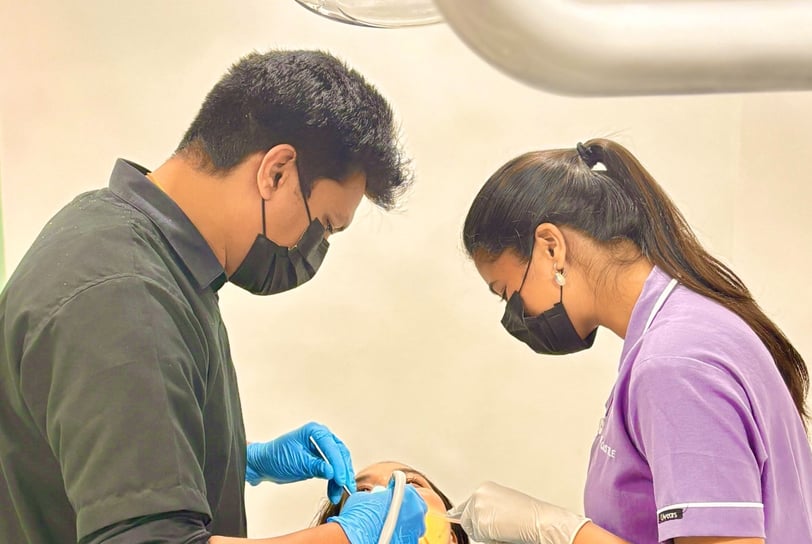Best Dental Clinic in Katraj White Castle Dental Clinic
When to Visit the Dentist: Recognizing a Dental Emergency
2/24/20254 min read


Understanding Dental Emergencies: Call to Best Dental clinic in Katraj
When to Visit the Dentist: Recognizing a Dental Emergency
Your oral health is just as important as your overall well-being. Many dental issues can start small but may escalate into painful emergencies if not treated in time. At White Castle Dental Clinic, Katraj, we believe in proactive care and timely intervention. Here’s when you should visit a dentist immediately:
1. Severe Tooth Pain
Persistent or throbbing tooth pain is a sign that something is wrong. It could be due to cavities, infection, or nerve damage. If the pain worsens at night or doesn’t go away with painkillers, seek immediate dental care.
2. Broken or Cracked Tooth
Accidents, falls, or even chewing on hard food can lead to broken or cracked teeth. If part of your tooth breaks off, keep the piece safe and visit the dentist as soon as possible. A timely visit can help in restoring the tooth with fillings, crowns, or bonding.
3. Tooth Fracture While Chewing
If you notice a sudden crack or a part of your molar tooth splitting while chewing, it’s a dental emergency. Such fractures can lead to infections if left untreated, so it’s best to get it evaluated immediately.
4. Knocked-Out Tooth
If a tooth is completely knocked out due to an accident, handle it carefully by holding it from the crown (top) and not the root. Try to place it back in its socket or keep it in milk and rush to the dentist. Immediate attention increases the chances of saving the tooth.
5. Swollen Gums or Facial Swelling
Gum infections, abscesses, or wisdom tooth complications can lead to swelling in the gums or one side of the face. If left untreated, these infections can spread to other parts of the body. Severe swelling should never be ignored.
6. Wisdom Tooth Pain and Swelling
If your wisdom tooth is erupting and causing severe pain, swelling, or difficulty in opening your mouth, you may need an evaluation. Impacted wisdom teeth can lead to infections, crowding, and discomfort.
7. Uncontrollable Bleeding
If you experience bleeding gums, especially after brushing or flossing, it may be due to gum disease. However, if bleeding doesn’t stop and is excessive, it could indicate a more serious issue.
8. Loose or Fallen Dental Filling/Crown
If your dental filling or crown falls out, it can leave your tooth exposed to sensitivity and further damage. A prompt visit to the dentist can help prevent additional complications.
9. Abscessed Tooth (Pus Formation)
A tooth abscess is a serious condition where pus collects due to infection. It often causes severe pain, swelling, and fever. Immediate dental care is required to prevent the infection from spreading.
Why Choose White Castle Dental Clinic, Katraj?
At White Castle Dental Clinic, we provide emergency dental care with a team of experienced and compassionate dentists. Whether it’s a severe toothache, swelling, or a broken tooth, we are here to relieve your pain and restore your smile.
If you experience any of the above symptoms, don’t wait! Call us or visit our clinic in Katraj for immediate assistance.
Dental emergencies encompass a range of urgent situations that pose a risk to an individual’s oral health and overall well-being. Recognizing what qualifies as a dental emergency is crucial for timely intervention that can mitigate complications. Generally, a dental emergency requires immediate care to alleviate pain, prevent further injury, or address serious concerns within the oral cavity. Common types of dental problems that warrant urgent attention include severe toothaches, fractured or knocked-out teeth, abscesses, and injuries to the gums or lips.
Severe toothaches are typically indicative of underlying issues, such as an infection or tooth decay, and can lead to more extensive complications if not treated promptly. Fractured teeth might not only cause pain but could also result in nerve exposure, making it essential to seek care immediately. Knocked-out teeth, or avulsed teeth, require swift action to increase the chances of successful re-implantation, usually within an hour of the incident.
Abscesses represent another critical situation, often manifesting as swelling, pain, or fever. This condition signals a bacterial infection that could spread if left untreated. Injuries to the gums or soft tissues of the mouth can also be classified as emergencies, particularly if they involve significant bleeding or difficulty in closing the mouth.
Distinguishing between urgent dental issues and regular dental visits is imperative. While routine check-ups and preventive care are essential for maintaining oral health, they do not address immediate threats to one’s dental welfare. Patients should be well-informed about scenarios that require urgent care, emphasizing the importance of recognizing these emergencies for timely and effective treatment
Additional Signs That Require Urgent Dental Care
In addition to the more commonly recognized dental emergencies, there are several additional signs that indicate the necessity for immediate dental attention. One such sign is persistent bleeding from the gums or mouth. While minor gum bleeding can occur due to vigorous brushing or flossing, ongoing bleeding is a concern that warrants a prompt visit to a dental professional. This could be indicative of underlying conditions such as periodontal disease or even a more serious medical issue that requires immediate evaluation.
Another red flag is noticeable swelling in the jaw or gums. Swelling can often signify an infection or an abscess, which may develop due to untreated cavities or other dental problems. Abscess formation is particularly concerning; it is typically marked by localized swelling and pus, and can lead to significant health complications if not treated urgently. In some cases, the infection may spread to other parts of the body, potentially resulting in systemic health issues.
Furthermore, individuals might experience severe and unexplained tooth pain, which can be accompanied by symptoms such as fever or a foul taste in the mouth. These indicators suggest the presence of an infection that necessitates immediate dental intervention. Ignoring these symptoms can lead to increased pain and more complicated treatments down the line, potentially involving tooth extraction or surgical intervention.
Regular dental check-ups play a crucial role in preventing emergencies by allowing for early detection of potential issues. Dentists can identify problems before they escalate into emergencies, ultimately safeguarding one's oral health and well-being. Being vigilant about these additional signs and maintaining routine dental care is vital in managing overall health and preventing urgent interventions.
